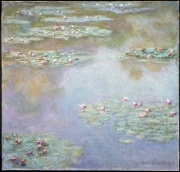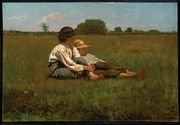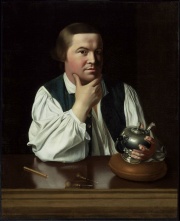Difference between revisions of "Oil paint"
| Line 2: | Line 2: | ||
== Description == | == Description == | ||
[[File:53.2552-SC35520.jpg|thumb|Boys in a Pasture<br>MFA# 53.2552]] | [[File:53.2552-SC35520.jpg|thumb|Boys in a Pasture<br>MFA# 53.2552]] | ||
| − | A paint made by grinding pigments with a [[drying oil]] such as [[linseed oil]]. After 1940, many oil paints contained [[alkyd resin|alkyd]] binders to provide faster drying times. | + | A slow-drying paint made by grinding pigments with a [[drying oil]] such as [[linseed oil]] primarily used to create a work of art.. Because it is slow- drying, the paint may easily be modified or blended after application. Oil paints are thinned with [[Turpentine (oil)|turpentine]] or [[white spirit]], and varnish may be added to increase the glossiness of the dried oil paint film. |
| + | |||
| + | Oil paints were first used in Asia as early as the 7th century AD and can be seen in examples of Buddhist paintings in Afghanistan. Oil-based paints made their way to Europe by the 12th century and were used for simple decoration, but oil painting did not begin to be adopted as an artistic medium there until the early 15th century. Common modern applications of oil paint are in finishing and protection of wood in buildings and exposed metal structures such as ships and bridges (Wikipedia, 2002). | ||
| + | |||
| + | After 1940, many oil paints contained [[alkyd resin|alkyd]] binders to provide faster drying times. | ||
== Synonyms and Related Terms == | == Synonyms and Related Terms == | ||
| Line 14: | Line 18: | ||
==Resources and Citations== | ==Resources and Citations== | ||
| + | * Wikipedia: [https://en.wikipedia.org/wiki/Oil_paint Oil paint] Accessed Sept. 2022 | ||
* ASTM, "Standard Terminology Relating to Paint, Varnish, Lacquer and Related Products", Annual Book of ASTM Standards, Section 6, Paints, Related Coatings and Aromatics, ASTM, D16, 7-Jan, Jul-96 | * ASTM, "Standard Terminology Relating to Paint, Varnish, Lacquer and Related Products", Annual Book of ASTM Standards, Section 6, Paints, Related Coatings and Aromatics, ASTM, D16, 7-Jan, Jul-96 | ||
Revision as of 14:05, 2 October 2022
Description
A slow-drying paint made by grinding pigments with a Drying oil such as Linseed oil primarily used to create a work of art.. Because it is slow- drying, the paint may easily be modified or blended after application. Oil paints are thinned with turpentine or White spirit, and varnish may be added to increase the glossiness of the dried oil paint film.
Oil paints were first used in Asia as early as the 7th century AD and can be seen in examples of Buddhist paintings in Afghanistan. Oil-based paints made their way to Europe by the 12th century and were used for simple decoration, but oil painting did not begin to be adopted as an artistic medium there until the early 15th century. Common modern applications of oil paint are in finishing and protection of wood in buildings and exposed metal structures such as ships and bridges (Wikipedia, 2002).
After 1940, many oil paints contained alkyd binders to provide faster drying times.
Synonyms and Related Terms
oil color; oil paints; oil stain; peinture à l'huile (Fr.); pintura al óleo (Esp.); tinta de óleo (Port.)
Comparisons
Websites of artist colours manufacturers
Resources and Citations
- Wikipedia: Oil paint Accessed Sept. 2022
- ASTM, "Standard Terminology Relating to Paint, Varnish, Lacquer and Related Products", Annual Book of ASTM Standards, Section 6, Paints, Related Coatings and Aromatics, ASTM, D16, 7-Jan, Jul-96
- Dictionary of Building Preservation, Ward Bucher, ed., John Wiley & Sons, Inc., New York City, 1996
- Art and Architecture Thesaurus Online, http://www.getty.edu/research/tools/vocabulary/aat/, J. Paul Getty Trust, Los Angeles, 2000


